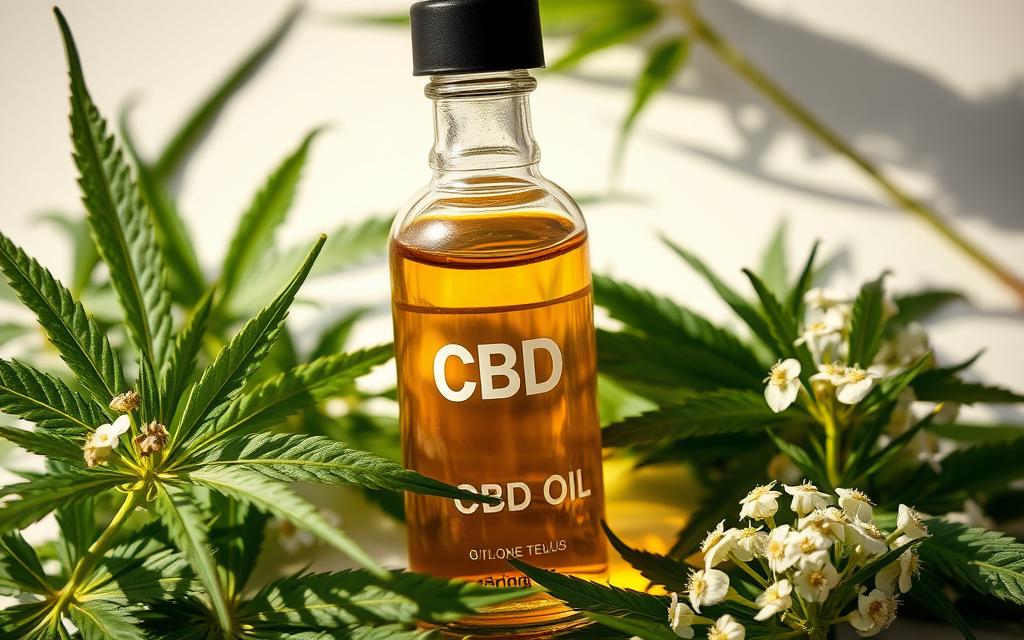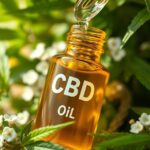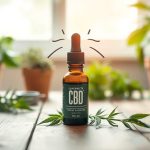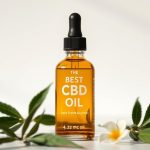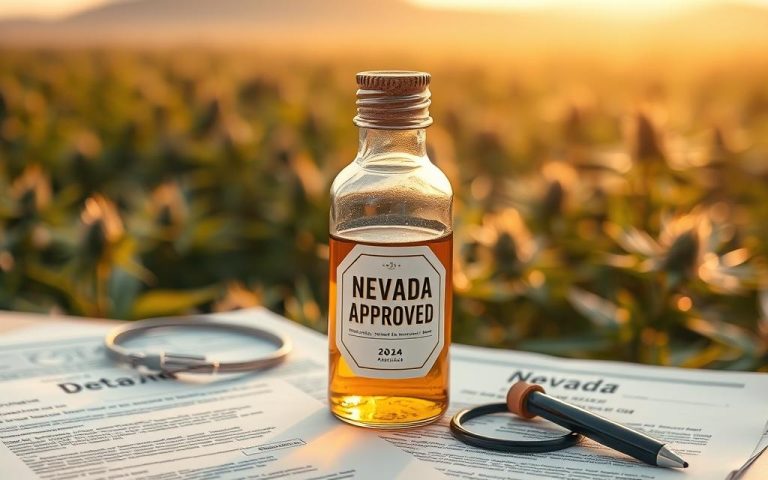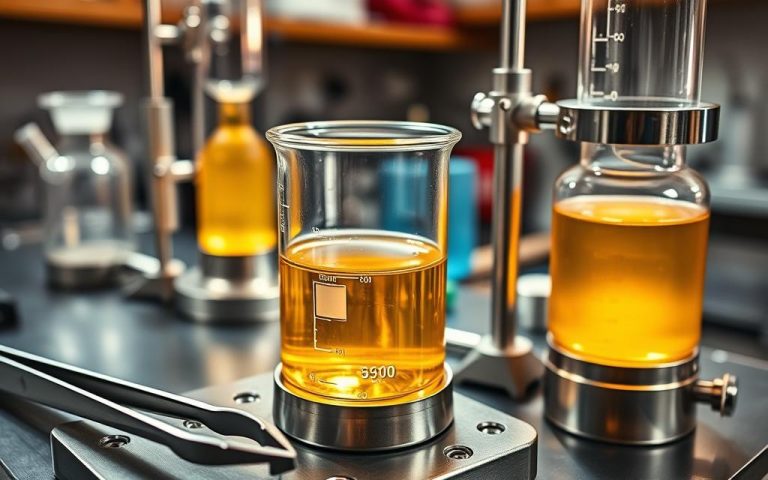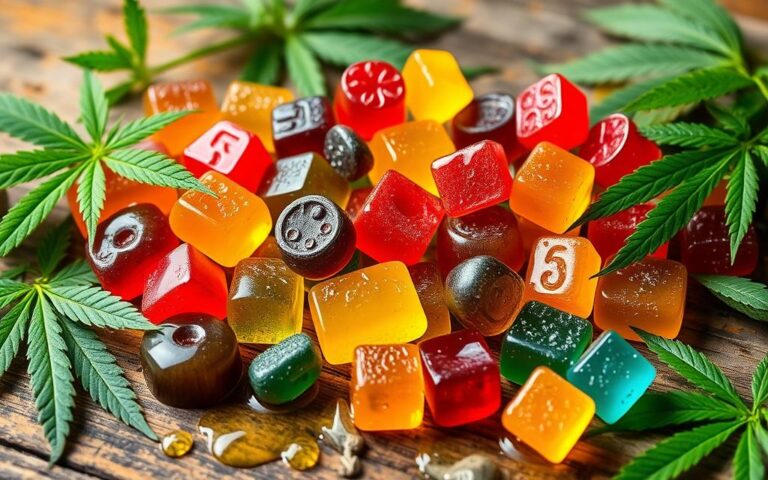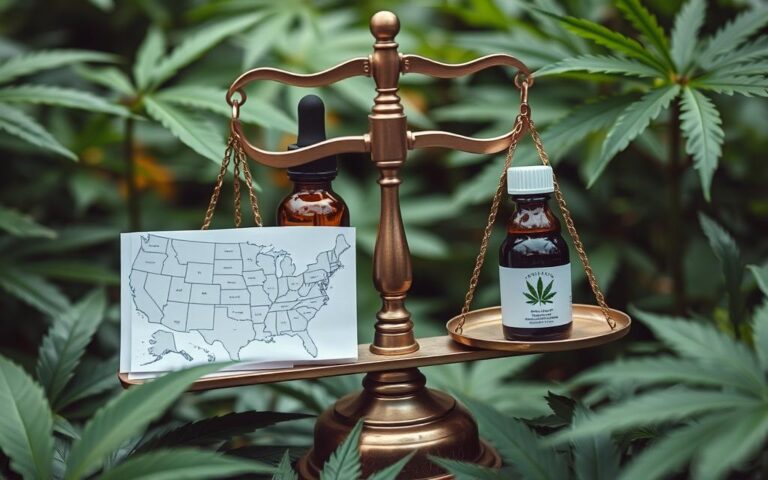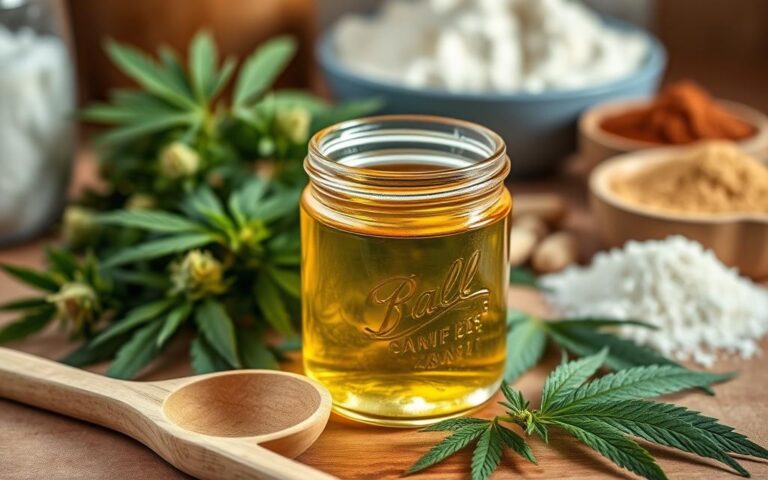Can CBD Oil Get You High? The Science Behind CBD
Cannabidiol, or CBD, is a non-psychoactive compound found in the cannabis plant. It has over 100 other cannabinoids, including Tetrahydrocannabinol (THC), the major psychoactive compound. CBD oil has become popular for its health benefits, but many are unsure about its link to THC and cannabis.
Research shows CBD is used for health issues like epilepsy, chronic pain, and migraines. The FDA has approved Epidiolex, a CBD-based medication, for certain severe epilepsy types. CBD oil comes in many forms, including capsules, oil drops, vapor, creams, and edibles like gummies. Knowing the science behind CBD oil and its benefits is key to making informed choices.
As CBD oil’s popularity grows, it’s important to clear up misconceptions. CBD is one of over 100 cannabinoids in cannabis and doesn’t cause a high. The endocannabinoid system is vital for functions like pain, memory, and immunity. CBD interacts with this system uniquely. Understanding CBD oil’s science and benefits helps us appreciate its value and make informed decisions.
Understanding CBD: What It Is and How It Works
CBD, or cannabidiol, is a chemical found in the cannabis plant. It’s part of over 100 compounds called cannabinoids. The body has a system called the endocannabinoid system, which has receptors for cannabinoids. This lets CBD interact with our bodies.
The endocannabinoid system helps control many body functions. This includes pain, mood, and memory. Unlike THC, CBD doesn’t make you feel high. It’s a non-psychoactive cannabinoid.
The Endocannabinoid System Explained
The endocannabinoid system has two main types of receptors: CB1 and CB2. CB1 receptors are in the brain and nervous system. CB2 receptors are in the immune system and other tissues. CBD works with these receptors to affect how the body responds.
Different Types of Cannabinoids
Cannabinoids are divided into two groups: phytocannabinoids and endocannabinoids. Phytocannabinoids come from plants, like CBD and THC. Endocannabinoids are made by our bodies, such as anandamide and 2-AG.
CBD vs THC: Key Differences
The main difference between CBD and THC is their effects on the mind. THC makes you feel high, but CBD doesn’t. CBD might help with inflammation and anxiety. THC could help with pain and nausea.
| Cannabinoid | Psychoactive Effects | Therapeutic Benefits |
|---|---|---|
| CBD | None | Reducing inflammation, anxiety, and pain |
| THC | Produces a high | Reducing pain, nausea, and inflammation |
Can CBD Oil Get You High? The Simple Answer
CBD oil is a chemical found in marijuana but it doesn’t have THC, the part that gets you high. UK laws say CBD products can’t have more than 0.3 percent THC. So, CBD oil doesn’t make you feel high.
CBD and THC are different because of how they affect you. THC is the part of cannabis that makes you feel “high”. CBD, on the other hand, doesn’t make you feel anything like that. It’s used for health benefits like stress relief and pain without the risk of getting high.
There are many types of CBD oil, like full-spectrum, broad-spectrum, and isolate. Full-spectrum has CBD and other cannabis stuff, but it has to be less than 0.3 percent THC. Broad-spectrum has lots of cannabis stuff but no THC. CBD isolate is just pure CBD, so it doesn’t make you feel anything.
In short, CBD oil doesn’t get you high because it doesn’t have much THC. It has health benefits and doesn’t make you feel anything like THC does. So, it’s a good choice for those looking for a natural remedy without the risk of getting high.
| Type of CBD Oil | THC Content | Psychoactive Effects |
|---|---|---|
| Full-spectrum | Less than 0.3% | No |
| Broad-spectrum | Undetectable | No |
| CBD isolate | None | No |
The Science Behind CBD’s Effects on the Brain
CBD works with neural receptors in our bodies, leading to different effects. This interaction helps us understand how CBD affects the brain. Research shows that CBD has a big impact on these receptors, which changes how neurotransmitters work.
Studies reveal that CBD changes how neurotransmitters talk to each other. Neurotransmitters control many things like mood, hunger, and sleep. CBD’s effect on these can lead to less anxiety and better sleep.
CBD’s Interaction with Neural Receptors
CBD’s interaction with neural receptors is complex. But research indicates it can bind to receptors like CB1. This can cause effects like less inflammation and better mood.
Impact on Neurotransmitters
CBD’s effect on neurotransmitters is significant. It can make more serotonin, which helps with mood. This can make us feel happier and less anxious. CBD can also make less dopamine, which is about pleasure and reward.
Research-Backed Evidence
Research supports using CBD oil for many things. It can help with anxiety, improve sleep, and reduce inflammation. A review looked at 194 studies, finding 17 that fit the criteria. It included 115 healthy people, 33 at risk for psychosis, and more.
Common Misconceptions About CBD Oil
Many people think CBD oil can make you high, but it’s not true. CBD oil doesn’t have enough THC to cause a ‘high’. Hemp-derived CBD oil has very little THC, always under 0.2%.
Some also believe CBD oil doesn’t help with anxiety. But, research suggests it might. The WHO says CBD is safe and could be a good treatment for anxiety. Here are some key points about CBD oil:
- CBD oil does not induce a ‘high’ as it contains little to no THC
- Studies have shown CBD may hold benefits for anxiety-related disorders
- CBD oil should contain no more than 1mg of THC in any one container to be legal
More research is needed to fully understand CBD oil’s effects. While some people find it helpful, we need more studies. 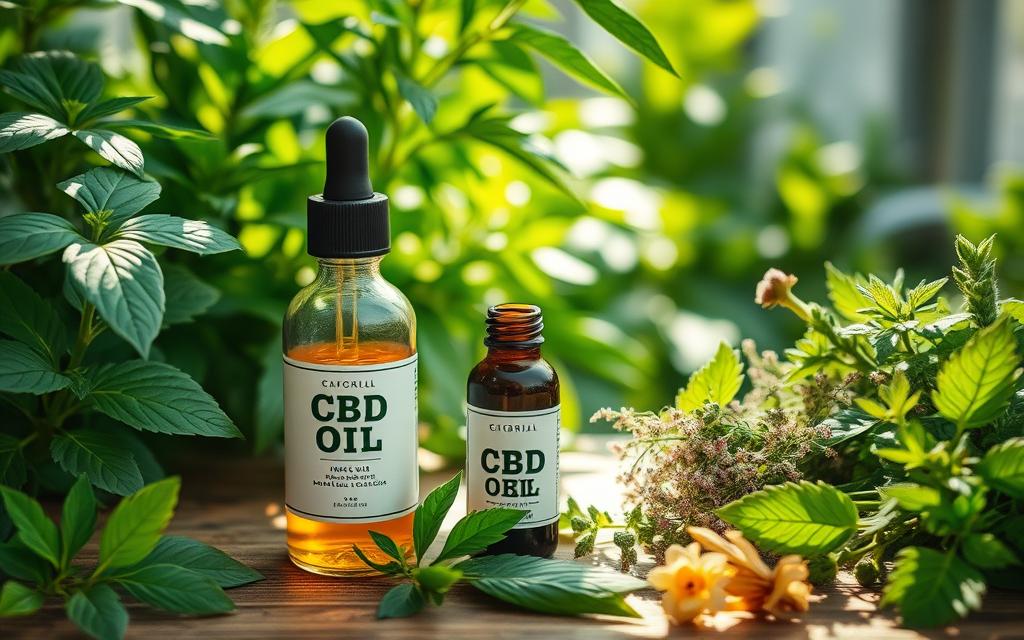
In conclusion, CBD oil is often misunderstood. Knowing its benefits and myths helps us make better choices. Always talk to a doctor before trying CBD oil, for any health reason.
| CBD Oil Benefits | Description |
|---|---|
| Anxiety-related disorders | Studies have shown that CBD may hold benefits for these conditions |
| Pain relief | CBD oil may be effective in reducing pain and inflammation |
| Sleep improvement | CBD oil may help improve sleep quality and duration |
CBD Oil Quality and Its Impact on Effects
CBD oil quality is key to its effectiveness and safety. The demand for CBD products is rising. It’s important to know about full-spectrum, broad-spectrum, and isolate CBD oils. Full-spectrum has all cannabis plant compounds, broad-spectrum has all except THC, and isolate has only CBD.
A study showed that over a quarter of online CBD products had less CBD than stated. This stresses the need for third-party testing to ensure quality. Always choose CBD products that have been tested and have clear labels showing CBD and other compound amounts.
Here are some key factors to consider when evaluating CBD oil quality:
- Look for products that have undergone third-party testing
- Check the label for the amount of CBD and other compounds present
- Choose products from reputable manufacturers
- Be aware of the possible risks and side effects of using CBD products
| CBD Oil Type | Description |
|---|---|
| Full-spectrum | Contains all compounds found in the cannabis plant |
| Broad-spectrum | Contains all compounds except for THC |
| Isolate | Contains only CBD |
Legal Status of CBD Oil in the UK
The legal status of CBD oil in the UK is complex. It’s governed by various laws and regulations. For a CBD product to be legal, it must come from approved industrial hemp. The THC level must be under 0.2% as per the Misuse of Drugs Act 1971.
In the UK, CBD producers need a license from the Home Office to operate legally. Selling CBD products requires a license, whether as a medical distributor or a nutritional supplement. Also, CBD products must be labeled correctly, following the Food Supplement Regulations 2003.
Some key regulations for CBD oil in the UK include:
- CBD cosmetics must comply with Cosmetic Product Safety Report regulations.
- CBD vape products must adhere to non-nicotine e-liquid regulations.
- The sale of CBD flowers and buds is illegal in the UK, even if the THC content is below 0.2%.
From February 2020, new CBD food and drink products need a Novel Food Application. The UK Food Standards Agency (FSA) also advises healthy adults to limit CBD from food to 10mg per day.
| Regulation | Description |
|---|---|
| Misuse of Drugs Act 1971 | THC content must be less than 0.2% |
| Food Supplement Regulations 2003 | Proper labeling of CBD products is mandated |
| Cosmetic Product Safety Report regulations | CBD cosmetics must comply |
Potential Side Effects of CBD Oil
CBD oil, like any other substance, can cause side effects. It is generally safe but knowing the short-term effects and long-term considerations is key. Common side effects include changes in appetite, feeling tired, and diarrhea.
Research shows CBD oil can also lead to liver damage and affect other medications. It’s vital to talk to a healthcare professional before using it. This is true for those with existing health issues or taking other medicines. The side effects of CBD oil can be serious, so weighing the benefits against the risks is important.
Some long-term effects of using CBD oil include:
- Liver damage
- Interactions with other medications
- Changes in mood
- Drowsiness
In conclusion, CBD oil can be helpful for many health issues. But, knowing the side effects and long-term considerations is critical. By talking to a healthcare professional and choosing high-quality CBD oil, you can reduce risks and enjoy its benefits.
| Side Effect | Description |
|---|---|
| Drowsiness | A common side effect of CBD oil, which can be beneficial for individuals with insomnia but may be a concern for those who need to stay alert. |
| Liver Damage | A possible long-term effect of using CBD oil, which can be lessened by consulting with a healthcare professional and monitoring liver enzymes. |
How to Choose the Right CBD Oil Product
Choosing the right CBD oil product involves several key factors. A good guide should explain the different types of CBD extracts. These include full-spectrum, broad-spectrum, and isolate. Full-spectrum CBD oil has all the cannabis plant’s compounds, including THC. Broad-spectrum CBD oil has most compounds but little to no THC.
It’s important to check for a Certificate of Analysis (COA) from independent labs. This shows the product’s quality and safety. Brands like Zatural offer third-party tested products from organic, toxin-free hemp plants.
Here are some key points to consider when choosing a CBD oil product:
- Check the THC level: Products made from hemp usually contain low levels of THC, typically around 0.3 percent.
- Look for third-party testing: A COA from an independent lab will provide information about the product’s quality and safety.
- Consider the type of extract: Full-spectrum, broad-spectrum, and isolate CBD extracts have different benefits and effects.
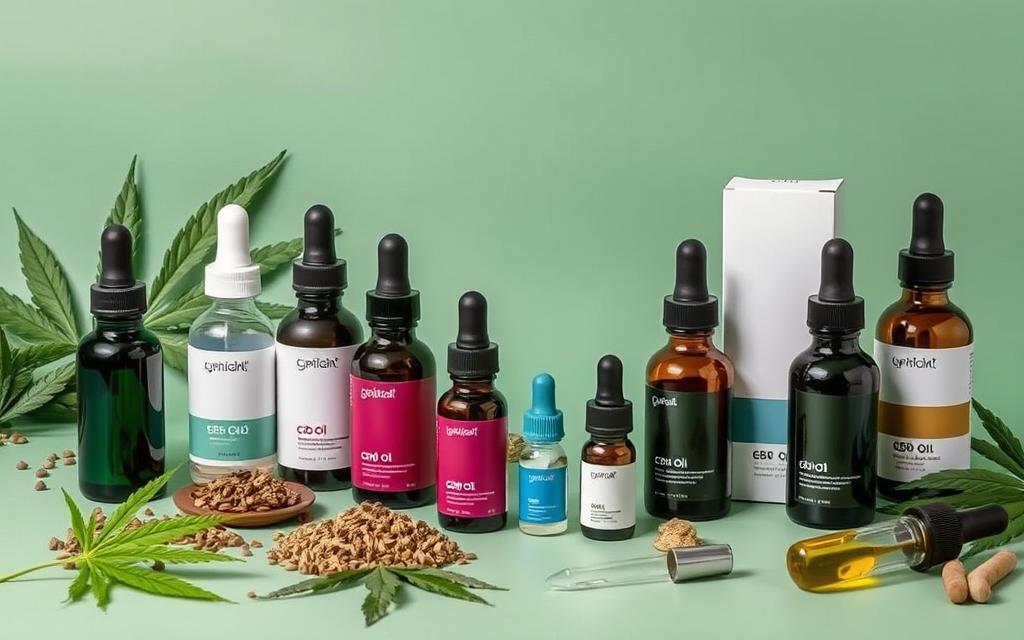
Choosing the right CBD oil product requires careful thought. By following this guide and doing your research, you can find a high-quality product. It should meet your needs and provide the benefits you’re looking for.
Proper Dosage and Administration Methods
Finding the right dosage and method of taking CBD oil is key. The amount needed can change based on your weight, health, and the type of CBD. Most people can handle up to 1,500 milligrams of CBD without issues.
For new users, starting doses might be 2.5 to 5 milligrams per kilogram of body weight, taken twice a day. It’s important to talk to a healthcare expert to find the best CBD oil for you. The way you take CBD, like capsules or topical treatments, can also impact how well it works.
Here are some common ways to use CBD:
- CBD gummies, which can take 30 to 60 minutes to take effect
- CBD sprays, which are the fastest-acting form of CBD administration
- CBD tinctures, which are easily absorbed and fast-acting
- Topical CBD treatments, which can help with skin issues like eczema and psoriasis
It’s important to know that some CBD products might not be labeled correctly. This can lead to problems. So, always choose high-quality CBD from trusted sources and talk to a healthcare professional before using it.
| Method of Consumption | Onset of Action | Efficacy |
|---|---|---|
| CBD Gummies | 30-60 minutes | Varies |
| CBD Sprays | Fastest-acting | High |
| CBD Tinctures | Fast-acting | High |
| Topical CBD Treatments | Varies | High for skin issues |
Drug Testing and CBD Oil Use
When using CBD oil, it’s important to think about drug testing. CBD oil doesn’t make you feel high. But, some CBD products might have a bit of THC, which drug tests can find.
To avoid failing a drug test, pick a top-notch CBD oil that’s been tested and has no THC. Opt for broad-spectrum or CBD isolate products. These are less likely to have THC.
Here are some tips for CBD oil use and drug testing:
- Check the product label and look for third-party lab testing results.
- Choose products that are labeled as THC-free or broad-spectrum.
- Avoid using CBD products that may contain THC, if you’re often tested.
Remember, drug tests can find THC in your body for days or weeks after use. If you’re using CBD oil and face drug testing, talk to a doctor or the test people. They can help figure out what to do.
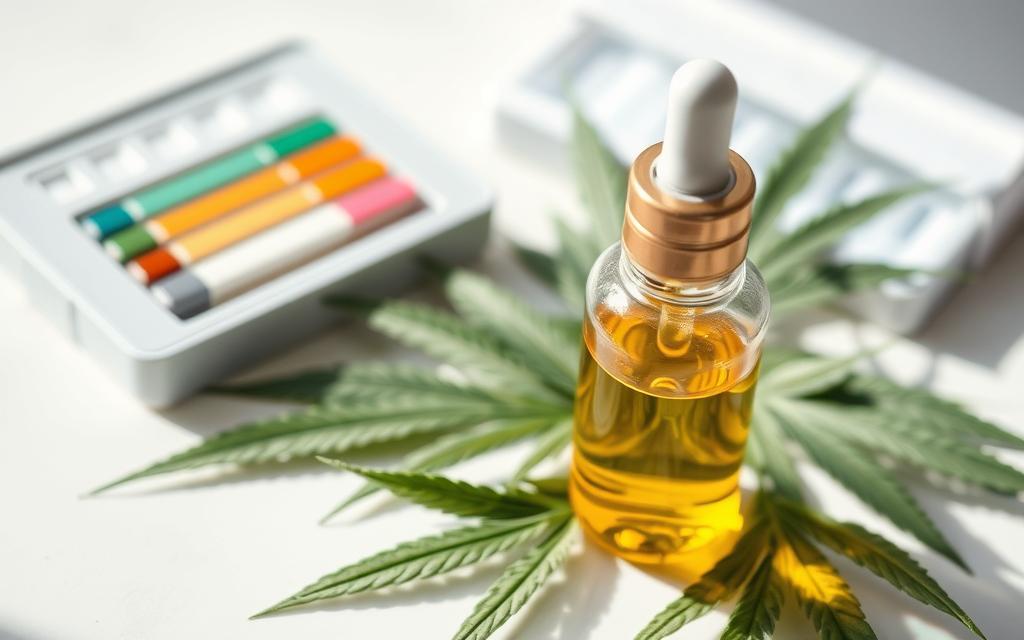
In short, CBD oil is mostly safe. But, knowing about drug testing risks is key. By picking quality products and understanding drug testing rules, you can enjoy CBD oil safely and avoid failing a drug test.
| CBD Product Type | THC Content | Risk of Positive Drug Test |
|---|---|---|
| Broad-spectrum | None or trace amounts | Low |
| CBD isolate | None | Low |
| Full-spectrum | May contain up to 0.3% THC | Higher |
What to Expect When Taking CBD Oil
When thinking about CBD oil, it’s key to know what to expect. This includes both immediate effects and long-term benefits. Many people use CBD oil to help with various symptoms.
Right away, CBD oil might help with anxiety and pain. It can also make sleep better. Long-term benefits might include less inflammation and better overall health. Always talk to a doctor before trying CBD oil, if you’re using it for a health issue.
Some benefits of CBD oil are:
- Relief from anxiety and stress
- Improved sleep quality
- Pain relief
- Reduced inflammation
In summary, CBD oil can be a great addition to your health routine. It offers both quick and long-term benefits. Always check with a healthcare professional before starting any new supplement, like CBD oil.
| Benefits | Description |
|---|---|
| Relief from anxiety and stress | CBD oil has been shown to have a positive impact on anxiety and stress levels |
| Improved sleep quality | CBD oil can help improve sleep quality, leading to better overall health |
| Pain relief | CBD oil has been used to alleviate pain and inflammation |
Conclusion: Making an Informed Decision About CBD Oil
Our journey into CBD oil has shown its promising side. It might help with anxiety, chronic pain, epilepsy, and sleep issues. But, it’s important to use CBD oil wisely and after careful thought.
There’s not enough science yet to fully trust CBD oil for all these uses. More studies are needed to know how it works and its side effects. Always talk to a doctor before trying CBD oil, as it could affect other medicines or health conditions.
The CBD market is expanding fast. It’s key to choose high-quality, tested CBD oil from trusted brands. By being well-informed and making smart choices, you can find the benefits of CBD oil.
FAQ
What is CBD oil and how does it differ from THC?
CBD oil comes from the cannabis plant but doesn’t make you high. THC is the part that does. CBD oil doesn’t have THC, so it doesn’t make you feel psychoactive.
How does CBD oil interact with the endocannabinoid system?
The endocannabinoid system helps control our body’s functions. CBD oil works with this system. It can change how our body works, which might help us feel better.
Can CBD oil get you high?
No, CBD oil doesn’t have THC. So, it doesn’t make you feel high or psychoactive.
How does CBD oil affect the brain and what are the research-backed benefits?
CBD oil affects brain receptors and neurotransmitters. Studies suggest it might help with anxiety, pain, and sleep. But, we need more research to know for sure.
What are some common misconceptions about CBD oil?
Some think CBD oil gets you high or is illegal. But, it’s not psychoactive and is legal in many places. More research is needed to understand its benefits fully.
How does the quality of CBD oil affect its effects?
The quality of CBD oil matters a lot. Things like how it’s made, its purity, and what else is in it affect how well it works. Always check for third-party tests and read labels to get good quality.
What is the legal status of CBD oil in the UK?
In the UK, CBD oil is legal if it has less than 0.2% THC. But, laws can change, so it’s good to stay updated.
What are the possible side effects of using CBD oil?
Most people find CBD oil safe, but some might feel tired, have diarrhoea, or changes in appetite. Always talk to a doctor before trying it, as it can affect other medicines.
How do I choose the right CBD oil product?
Look at the hemp source, how it’s made, and what’s in it. Also, check third-party tests. A doctor’s advice can help pick the best one for you.
What is the proper dosage and administration method for CBD oil?
Dosage and how to take CBD oil vary. Start small and increase as needed. Consider your weight, what you want to achieve, and how you’re taking it. A doctor can help figure out the right amount and how to take it.
How does CBD oil use affect drug testing?
CBD oil itself doesn’t have THC, but some products might. This could lead to a false positive on a drug test. Always check with a doctor before using CBD oil, if you’re tested regularly.
What should I expect when taking CBD oil?
CBD oil’s effects can differ for everyone. Some might feel better right away, while others might see benefits over time. Be patient and consistent, as it can take time to notice the effects.
